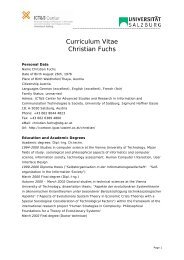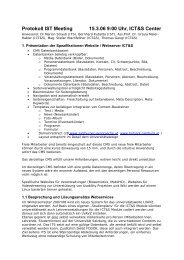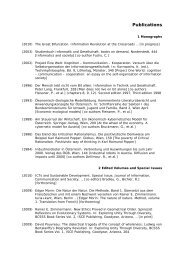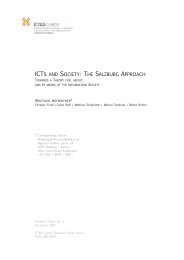CHRISTIAN FUCHS - ICT&S - Universität Salzburg
CHRISTIAN FUCHS - ICT&S - Universität Salzburg
CHRISTIAN FUCHS - ICT&S - Universität Salzburg
Create successful ePaper yourself
Turn your PDF publications into a flip-book with our unique Google optimized e-Paper software.
Christian Fuchs: Social Networking Sites and the Surveillance SocietyIt would be rather harmful if parents try to control these spaces:“Many adults believe that these restrictions are necessary to prevent problematicbehaviors or to protect children from the risks of society. Whether or not that viewis valid, restrictions on access to public life make it difficult for young people tobe socialized into society at large. (...) We are doing our youth a disservice if webelieve that we can protect them from the world by limiting their access to publiclife. They must enter that arena, make mistakes, and learn from them. Our roleas adults is not to be their policemen, but to be their guide“ (boyd 2008b).boyd (2007b) formulates the hypothesis that MySpace users are primarily kids withworking class background. MySpace users would also include music freaks and “kidswho are socially ostracized at school because they are geeks, freaks, or queers”. Shecalls these teens the subaltern teens. Hegemonic teens would mainly use Facebook.“These kids tend to come from families who emphasize education and going tocollege. They are part of what we'd call hegemonic society. They are primarilywhite, but not exclusively. They are in honors classes, looking forward to theprom, and live in a world dictated by after school activities”.Hegemonic kids on Facebook would have a negative view of the subaltern kids onMySpace. boyd (2004) characterizes Friendster as a site for self-presentation, a site forconnection, and a site with faked profiles (Fakester). boyd (2006a) found in a case studyof Friendster that the most common reasons for adding someone to friends lists werethat these people were actual friends, acquaintances, family members, or colleagues.Social networking platforms like MySpace would be “full-time always-on intimatecommunities” (boyd 2006b). boyd and Heer (2006), based on participant observationincluding interviews, survey, and focus groups of 200 Friendster early adopters, arguethat the Fakster profiles served playful purposes and were viewed by their creators asartistic creations.David Beer (2008b) argues that the research agenda outlined by boyd and Ellison(2007) is too much focused on the user and excludes macro-contexts.“By focusing solely upon the user, which is what boyd and Ellison's closingsection on 'future research' suggests, we are overlooking the software andconcrete infrastructures, the capitalist organisations, the marketing and advertisingrhetoric, the construction of these phenomena in various rhetorical agendas, therole of designers, metadata and algorithms, the role, access and conduct of thirdparties using SNS, amongst many other things. (…) Capitalism is there, present,particularly in the history, but it is at risk of looming as a black box inunderstandings of SNS. (…) This is what is missing, a more political agenda that ismore open to the workings of capitalism. At the moment we are informed largelyby accounts of these spaces where we can connect, spaces that are host to new orremediated social connections, spaces that are democratic and mutually owned –the direction boyd and Ellison intimate and their focus solely upon the user looksto perpetuate this agenda even if unintentionally, at least, in my reading, that isthe risk. My feeling is that the dominant visions of the democratization of the web17









